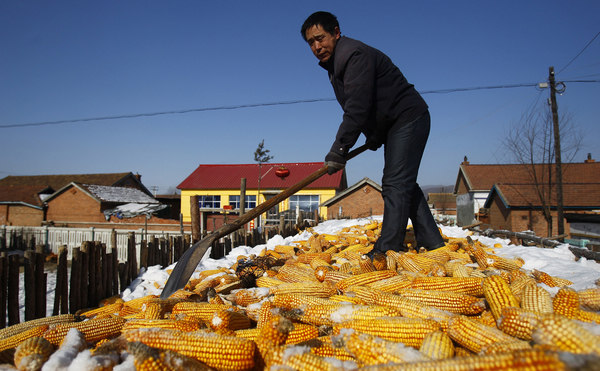Riches from Russia with love
Updated: 2012-03-02 08:12
By He Na and Han Junhong (China Daily)
|
||||||||
Trading places
As more followed, the Shulan government established the Russia Labor Export Association to offer advice and guidance to people wanting to work, live or do business in the country.
Jilin shares a 232.7 kilometer border with Russia, which gives it a geographical advantage, while certain regions of Russia have sparse populations and lack strong labor forces.
 |
|
The success of village traders in Russia has also brought drawbacks, though, such as the lack of people to work in the surrounding farmlands. [Photos by Dong Jingqi / for China Daily] |
Today, Sihe residents have businesses across the vast expanse of Russia, from Vladivostok in the east to Novosibirsk in the west.
According to official figures for Xiaocheng, the town that comprises Sihe, more than 90 percent of the 1,964 residents who worked abroad last year went to Russia, with the rest heading to South Korea and Japan. Together they returned with more than 120 million yuan, the local government said.
Many traders from the area have set up shop at a market nicknamed "Shulan Street" in central Moscow.
"My first business in Russia was at Shulan Street," said Zhao Baoqing. "It's safer to be with villagers in an alien country. The people who started doing business there early often helped latecomers.
"It's not easy to do business there, there are often disputes. But we're united when we face problems," he added.
Empty homes
Despite its wealth, Sihe cannot escape the one characteristic that is shared by all rural communities with large migrant workforces: a lack of young men.
Except for during traditional family occasions such as weddings and national holidays, the village is made up largely of women, children and the elderly. On evenings, less than half of its homes show any sign of life.
"Many of those people who earned money from working and trading in Russia moved to cities (in China)," said deputy village head Qiu Tingfa. "I went to Russia for business before, but I couldn't get used to the life there, so I came back. My sisters and brothers are still there, though."
He now runs a large leisure-activity center in Xiaocheng.
"Every spring plowing season, more than half of the people who appear in the fields of Sihe come from other places," he said. "The majority of Sihe's 400 hectares of farmland has been rented out."
Li Shaochun, 39, is among the many villagers who have used the money they have earned in Russia to renovate their properties. After he spent more than 100,000 yuan, his house boasts the latest electronic appliances and is more modern than those in major cities.
Yet, he hardly ever sees it. For this year's Lunar New Year festivities, a traditional time for family reunions, he stayed just five days before heading back to Moscow.
"My wife and son are there (in Russia), and I worry about them," Li said. "The conditions in our Moscow house are very poor. We co-rent with another family six people crowded in an area of 48 square meters.
"Compared with many newcomers, though, we've got it much better. They live in lodging houses where there are 10 people in rooms the size of 10 square meters."
Bring it back
With labor export now a pillar industry for Shulan, officials are attempting to persuade successful traders to invest some of their wealth back into their native communities and help others.
"Sihe's model is not easy to copy," said Dong Yanguang, director of Shulan's employment office. "We need to still encourage labor export, but we also need those who have become rich to come back and spend money here."
The city has introduced several preferential policies to achieve that goal, which had led so far to 767 original inhabitants returning and establishing 563 enterprises. With a combined investment of 600 million yuan, almost 8,000 new jobs have been created.
Yet, it is the success stories of villagers in Russia that are getting more attention from young people, especially in Sihe.
With their options still limited largely to working in fields, cadres expect to see even more pack their bags for trips across the border in coming years.
Contact the reporter at hena@chinadaily.com.cn

 Relief reaches isolated village
Relief reaches isolated village
 Rainfall poses new threats to quake-hit region
Rainfall poses new threats to quake-hit region
 Funerals begin for Boston bombing victims
Funerals begin for Boston bombing victims
 Quake takeaway from China's Air Force
Quake takeaway from China's Air Force
 Obama celebrates young inventors at science fair
Obama celebrates young inventors at science fair
 Earth Day marked around the world
Earth Day marked around the world
 Volunteer team helping students find sense of normalcy
Volunteer team helping students find sense of normalcy
 Ethnic groups quick to join rescue efforts
Ethnic groups quick to join rescue efforts
Most Viewed
Editor's Picks

|

|

|

|

|

|
Today's Top News
Health new priority for quake zone
Xi meets US top military officer
Japan's boats driven out of Diaoyu
China mulls online shopping legislation
Bird flu death toll rises to 22
Putin appoints new ambassador to China
Japanese ships blocked from Diaoyu Islands
Inspired by Guan, more Chinese pick up golf
US Weekly

|

|







